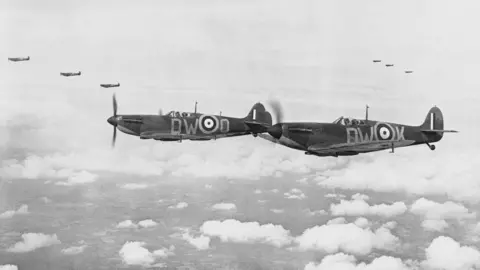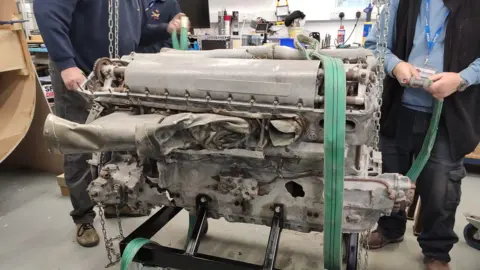One WW2 Spitfire engine's 'fascinating story'
 Getty Images
Getty ImagesThe engine of a Spitfire that crashed in a field in East Sussex during World War Two is set to go on display in a museum.
How it got there has been called a "fascinating" story.
When Phil Wooller was a boy he saw the aircraft come down in a field near his family's farm in Arlington on a spring morning in 1942.
His daughter-in-law Jane Wooller told the BBC the Australian pilot Ted Hall - who Mr Wooller later met - parachuted out of the plane after its windscreen became coated in oil due to a fault.
 Jane Wooler
Jane WoolerThree decades later aviation archaeologists came looking for the Spitfire.
Ms Wooller said they asked Mr Wooller - then the only person alive who knew where it was - if he could help them recover the plane.
He agreed, but cheekily only if he got to keep the engine, she said.
They recovered the 0.75 tonne hunk of metal, buried 24ft (7.3m) underground, where it spent the next decade sitting on a farmyard.
Ms Wooller said it was eventually flown by helicopter to the Redoubt Museum in Eastbourne after they "somehow" found out about the historical artefact. Here it was displayed until the museum closed in 2022.
Her husband Ashley had been left the engine in his father's will after he passed away in 2019, which meant the family had to find it a new home.
After a lot of hard work, involving several family members, she said they gave the engine to Tangmere Military Aviation Museum in West Sussex, where it is set to go on display in May.
Ms Wooller said it was worth the effort: "The engine is a unique piece of aviation history.
"To see something that's been absolutely trashed and put on display with the history behind it is amazing," she said, detailing that people from "nine to 90 were fascinated" by it.
Ms Wooller told the BBC the family originally planned to turn the engine – which she described as a "bit bent" - into a coffee table.
"This is almost dedicated to Phil because he's the one who started all of this."
"If it wasn't for him. We wouldn't be doing what we're doing today," she said.
Follow BBC Sussex on Facebook, X and Instagram. Send your story ideas to [email protected] or WhatsApp us on 08081 002250.
